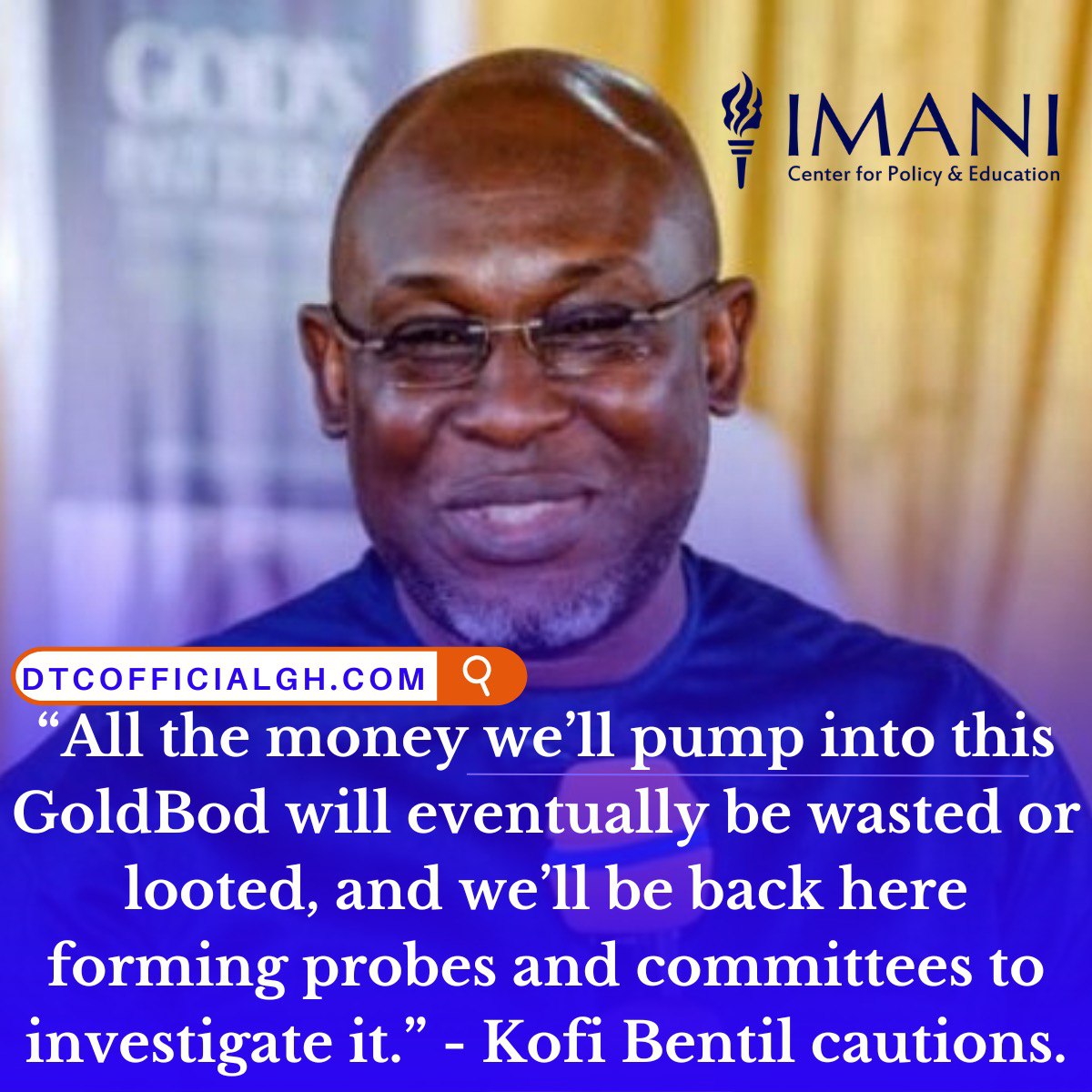Is Ghana’s new gold initiative truly a game-changer — or are we sitting on a ticking time bomb?

In a bold yet cautionary commentary, Kofi Bentil, Vice President of IMANI Africa, has raised significant concerns about Ghana’s newly proposed GoldBod initiative, which aims to centralize gold trade, regulation, and exportation into a single government-controlled entity.
Bentil, known for his sharp policy insights, acknowledges the initiative’s noble intent: to boost Ghana’s foreign reserves by accumulating gold and minimizing smuggling. But beneath the surface lies what he describes as “landmines” — structural flaws and dangerous assumptions that could derail the entire mission.

Good Motives, Flawed Execution?
“The motivation behind GoldBod is solid,” Bentil said. “But the devil is in the details.”
Ghana has long struggled to maximize benefits from its rich gold resources. The GoldBod is supposed to fix that — consolidating regulatory, commercial, and enforcement powers to reduce gold smuggling and ensure the Bank of Ghana can stockpile reserves. However, Bentil argues that this one-stop-shop structure is a policy misstep that could create more problems than it solves.
RELATED POST: GoldBod: A Game-Changer or Just Another Political Gimmick?
Too Much Power in One Place
Bentil warns that concentrating too much authority in a single institution — especially one that acts as buyer, regulator, and enforcer — opens the door to corruption and abuse. He draws a parallel to the now-defunct anti-galamsey task force, noting that officials assigned to stop illegal mining eventually became part of the problem.
“If you’re the buyer and the one checking the purity of the gold, what stops you from saying 90% purity is actually 60%, so you pay less?” he questioned. “The system becomes judge, jury, and executioner — that’s dangerous.”
READ ALSO: Income From Betting Should Be Taxed Like Any Other Revenue Stream.
Assumptions That Don’t Hold
According to Bentil, three flawed assumptions underlie the GoldBod model:
- That perfect, incorruptible people will run the institution.
- That flawless system will be implemented.
- That the operating environment will be free of manipulation and exploitation.
“None of these ever happens in real life,” he stressed. “When you set up such powerful institutions, people immediately start figuring out how to game them.”

Market Forces vs. State Funds
In today’s gold-hungry global economy, Bentil sees no reason why the government should be using taxpayer money to buy gold. Private investors, he argues, are already eager to enter the space — so why not allow market dynamics to operate freely?
“All the money we’ll pump into this will eventually be wasted or looted,” he cautioned. “And we’ll be back here forming probes and committees to investigate it.”
READ ALSO; Ghanaians Complain of Corruption Because They Are Not Beneficiaries – Dennis Appiah Larbi
Will GoldBod Stop Smuggling?
While supporters of the bill argue that GoldBod will reduce smuggling and stabilize the cedi, Bentil is less convinced. For him, only strict enforcement and real punishment can truly curb illegal trade.
“If the government becomes the only buyer, it may reduce smuggling — but it won’t stop it,” he said. “Eventually, when too much power is concentrated, those in charge will start smuggling themselves.”
READ ALSO: We Need Deliberate and Sustained Efforts to Win the Fight Against Single-Use Plastics – Peter Agbeko
The Cocoa Board Example
Bentil drew a sobering comparison to Ghana’s Cocoa Board, which was once seen as a lifeline for the economy. “Today, cocoa farmers are among the most taxed and poorest in the country,” he stated. “When cocoa was in private hands, people built wealth. The moment the state took it over, the farmers got poorer.”
Proceed with Caution
While the GoldBod bill is well-intentioned and potentially transformative, Bentil insists it must be restructured before implementation.
“This is a good direction,” he said, “but the model is problematic. If we don’t amend it quickly, it will explode one day.”
Follow us on Twitter and WhatsApp for more.





2 Responses
[…] READ ALSO: Is Ghana’s new gold initiative truly a game-changer — or are we sitting on a ticking time bomb? […]
[…] READ ALSO: Is Ghana’s new gold initiative truly a game-changer — or are we sitting on a ticking time bomb? […]